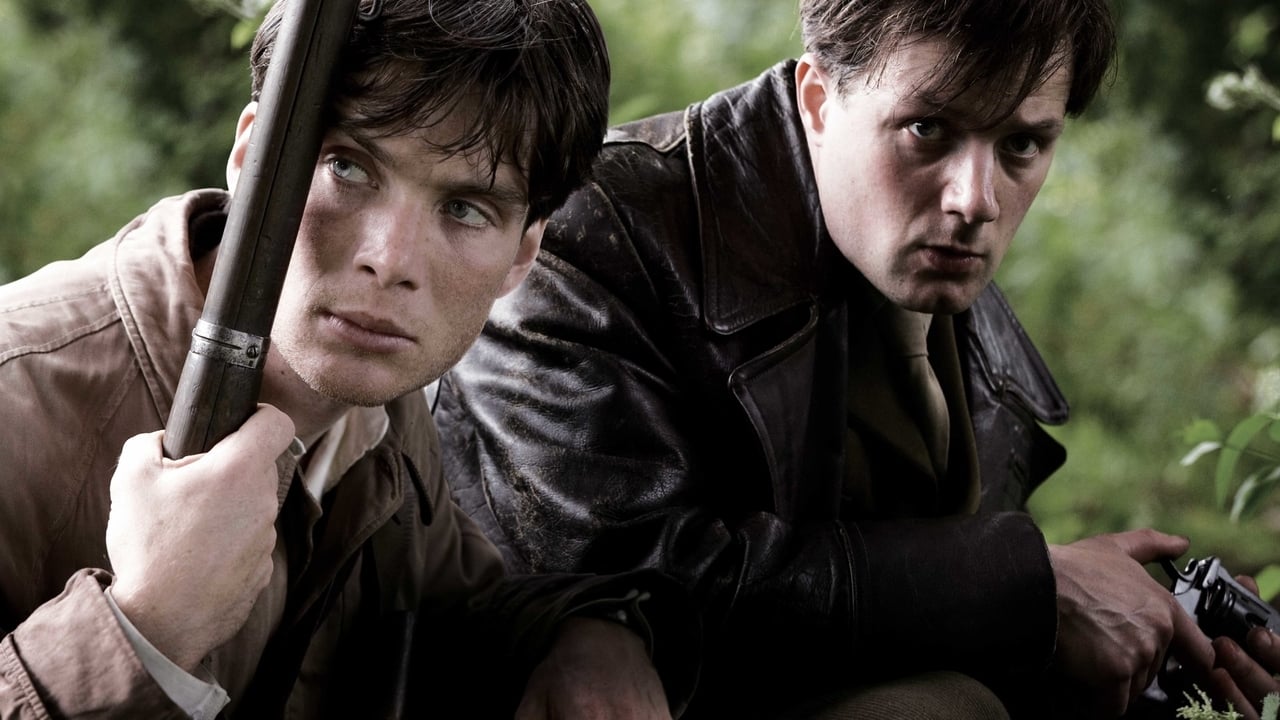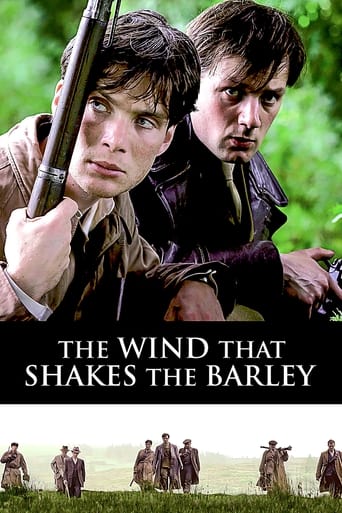

What a waste of my time!!!
... View MoreThe greatest movie ever made..!
... View MoreThere are moments that feel comical, some horrific, and some downright inspiring but the tonal shifts hardly matter as the end results come to a film that's perfect for this time.
... View MoreGreat story, amazing characters, superb action, enthralling cinematography. Yes, this is something I am glad I spent money on.
... View More"The Wind That Shakes the Barley", first of the two Golden Palm winners directed by Ken Loach, starts in the kind of cinematically traditional fashion that doesn't prepare you for how innovative it is on an intellectual basis. Yes, intellectual.Young lads are playing hockey on a field so richly green you wouldn't believe it's anywhere outside the Emerald Isle. After the game, a heartfelt exchange of farewells between Damien O'Donovan and the O'Sullivan clan is interrupted by the fierce intervention of the infamous "Black and Tans". The troop came to remind that collective demonstrations are severely prohibited and that went for sports game too. What follows is no game at all.Things escalate quickly when one of these young Irishmen, too angry or maybe too proud to measure up the danger decides not to cooperate at all. He says his name in Gaelic and keeps his eyes and chin up with a defiant smirk that earns him a 'permanent' beating. That martyrdom is still not enough to convince young promising doctor Damien O'Donovan (brilliantly played by Cillian Murphy) to swell the ranks of the fighters, among them his older brother Teddy (Padraic Delaney) against the British colons. We're all aware that in cinema's tradition it's not uncommon for the most valiant fighters to start as outsiders or even be labeled as cowards but Ken Loach doesn't use these narrative conventions at the expenses of realism. The episode that ends up triggering Damien's determination doesn't consist on another life-threatening situation yet it is far less than being anecdotic. On the train station, he sees the driver named Dan (Liam Cunnigham) being brutalized by British soldiers because he refused to transport them, nothing to do with Irish pride but union rights forbidding him to transport weapons.This is interesting in the way it establishes the real motivations of Damien, he's not driven by romanticism but realism, and these nuances will play a gradually important role as the story progresses. Meanwhile, Ken Loach exposes the familiar elements such as the training of the troops, the first successful operations, the first sheds of blood with an attention to details that make each operation believable and heart-pounding in their unpredictable outcome. The performance of Murphy is crucial because we always identify with his outsider's status while his involvement gets deeper and his initial persona progressively diluted in the painful obligations. There was a 1969 movie named "Army of Shadows" depicting with an eerie realism the existential corners a fight against occupation drove some ordinary men: executing a traitor with a towel, resigning to swallow a cyanide capsule or even worse, dying in total anonymity without any posthumous recognition whatsoever. But for all its grittiness, the movie didn't leave any doubt about the righteousness of the fight lead by French civilians for the enemy was the Nazi occupants, if it didn't make any death satisfying, we knew everyone did the 'right thing' even when it meant the worst.Now, you have "The Wind That Shakes the Barley", a movie all in bright palettes of green, nothing to do with the gray shadowy streets of Melville's masterpiece, but if this film that starts like your typical exhilaration of the fight for freedom, there is slowly but surely, in a way that credits Ken Loach' respect for his viewers, a gradual existential questioning. In a scene that echoes the traitor's execution in 'Shadows', Damien must shoot the friend who denounced them. At this point, you can see that it's a part of himself he's killing with the poor frightened kid and that there's no return to normality after that. Indeed, we've seen sickening scenes of torture before, we know how violent the British were, but the film still allows his main protagonist to hope that Ireland will be worth the fight, this is no "Braveheart"'. The execution is a poignant moment but what goes next is a triumph of writing and self-questioning. It consists on a long discussion about a verdict forcing a rich Irish man to pay a poor woman back because of high interest rates, this is the first judgment rendered by an independent Irish court but many fighters, including Damien's brother refuses to ostracize the richer ones as they're the most important fundraisers.We can see the first breeches of discord within the group, some believe the fight needs money, some that the power must be given to the people. And what we've got here is a film that asks two questions: is the fight worth it after all, since it makes you kill your own people? Or will it be worth it since it will keep the same system just under a different flag. The question becomes crucial after the partition of Ireland and its dominion status maintained, causing a permanent shift between Loyalists and Nationalists and culminating when a man is forced to execute his own brother, remaking the very moment where Damien killed the traitor. Damien would recall the memory to point out that there's no possible bargain with him.Damien's views seem politically motivated and Ken Loach was criticized for injecting his left-wing views within the story, but there's no doubt that there was starvation in Ireland and that a real ideological shift occurred within the fighters. And it says a lot about the misleading exhilaration of "fighting" when you believe in one enemy before you discover that it can be within your own nation, your own blood. There's a moment where the Loyalists mention that Britain needs to save face not to encourage other countries like India. At the end, I kept thinking of India and the sad aftermath of Gandhi's fight for the Independence when Muslims and Hindus started killing each other.British criticized Ken Loach's self-loathing approach, in fact, he does justice to the two sides of the fights by confronting them to their historical responsibility. And anyone who believes this is an Anti-British understood nothing from the film or didn't even see it.
... View MoreA powerful story of two brothers in their struggle for Irish independence during turbulent times. Cillian Murphy gives a great performance whilst the story line details the struggles against the British Black and Tan forces in Ireland. The brotherly rivalry aligns well with the national divide of the time. Ken Loach has provided stunning visuals and the landscape provides a very authentic feel. An excellent film for the neutral and a must for anyone with an interest in Irish history.
... View MoreThe Wind that shake the Barley is a film which was released in 2006 and directed by Ken Loach. The action takes place in Irland in the 1920s. The main character is played by Cillian Murphy. It won the "Palme d'or" at the Cannes festival. It's a war movie that mixes history and drama. The movie begins with a match of hurling between some friends in 1920. After that, the players go back home. The lives in a little hamlet, in the Irish countryside. But there, they are screeching halt by the forces of the British orders. Normally, all public meeting, sport include, are band, because of the war. The forces of British orders ask them about their names and jobs, but one of the Irishes, Micheail, answer in Gaelic, which is a prohibited language. Because of that, he's killed by the forces of British orders. Damien, who wants to become a doctor, must go to London to continue his studies, but the others think it's a treason. The want him in the Irish Republican Army, to revolt, and avenge the death of Micheail. He refuses. To go to London, Damien go to the train station. There, the forces of British orders want the driver go back in the train and drive. But the driver refuse. The soldiers hit him and his assistant. It's thank to that and to the death of Micheail, Damien changes his mind, and join the IRA.... The Wind that shake the barley is a true representation of the Anglo-Irish war and the Irish civil war. It's explained very well. I really liked this movie because you learn a lot of things about the Irish history. It's really interesting. I recommend it to people who want to know things about Ireland's history, and who are not too sensitive, because it's a quite violent movie. But don't worry, it'not too complicated to understand. I'm a french boy I understand all the movie. I hope you will like this movie as much as me. Good watching ! Good bye !
... View MoreI always admire movies, that say to you more than simply obey the law of nature. If everyone of us was not a fighter but a better man the world would have been a better place. You cannot compromise your morale and humanity if you are a man and not a beast, we are all dust, from dust we came and in dust we will end, but what we do in our lifetime separates us from other creatures. Their cause was bloody and heroic and our fight is just to be the best humans we can and not another Teddy because every true heart impulse has it's self preserving and self-lying Teddy thought to counter it. I believe that only such a true story is meaningful and has the ability to make blood warm and desire strong. That's why I welcome you to share and review this movie with your friends.
... View More